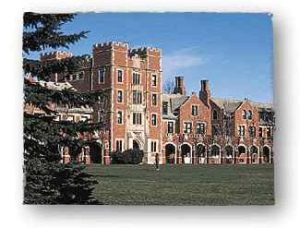
I’ve been getting questions from parents who are agonizing about where their teenagers should attend college.
It’s a tough decision and time is running out to pick the winners. The national deposit day for freshman is May 1.
College Choices
Here are some of choices facing a family that contacted me yesterday:
St. Olaf, Grinnell, Bryn Mawr, Whitworth, Rose Hulman and Trinity.
A friend of mine came over last week to talk about her son’s final four:
Willamette, Lewis & Clark, University of Redlands and Texas Christian University.
My friend’s son appears to truly not know where he wants to go and he also has no idea what his major might be.
I’m going to share the advice that I gave my friend that might help other families with this big decision. Taking this approach is going to be better than flipping a coin!
1. Review the finances.
It should be easier to eliminate schools from a list if they are too expensive. I don’t think any school is worth going into scary debt. In my friend’s case, two of the schools gave her son merit scholarships and two didn’t. If you aren’t sure you are reading the financial aid letters correctly, here are a couple of my posts that could help clear up the confusion:
2. Check student opinions.
I’d check out student opinions at Unigo and College Prowler. You might be surprised at how candid students are in their reviews. If you read enough of them you might be able to see a consensus of opinions.
3. Ask students questions.
Students making last-minute visits to schools should stop several students and ask these questions:
- What do you like about your school?
- What don’t you like about your school?
- What would you change about your school if you could?
- Why did you pick this school and would you do it over again?
Teenagers who won’t be visiting should ask the school to connect them with current students who can chat by phone or Skype.
If a teenager thinks he/she knows what his major will be, try to arrange to talk with students in that department to get the real scoop. Also see if you can chat with professors. You might have a tougher time pulling this off at a university where professor contact with undergrads can be more limited.
4. Know the Difference Between a College and a University.
Many parents and students don’t understand how vastly different a college can be from a university.
Students who have both on the list, such as the teenager above who applied to San Diego State and Sarah Lawrence, would have a dramatically different experience at each of these schools.
Here is a primer on what the differences are between these these two types of institutions:
Do you Know the Difference Between a College and a University?
5. Check a school’s graduation rates.
You don’t want to get stuck at a school for five or six years. You can obtain the four, five and six-year rates for any institution at College Results Online or at the microsite of The Chronicle of Higher Education. To reach the latter site, you can just Google College Completion.
6. Research how happy are the freshman.
Ideally, you’ll want to attend a school where the vast majority of students stick around after their freshman year. You can find freshman retention rates at College Results Online and at the federal College Navigator. Here is a post I wrote about freshmen retention rates for my college blog: How Happy Are the Freshmen?
7. Check RateMyProfessors ratings.
You can get a sense of the quality of teaching at a school by looking at its composite professor ranking for its faculty. Millions of students have ranked professors on a 1-to-5 scale at RateMyProfessors.
You can also drill down and see what the rankings are for individual departments and professors at a school. Here is a post that I wrote recently about this site: Are the Professors Any Good?
8. Check the Prof Ratings at the Princeton Review.
Every year The Princeton Review publishes its big thick guide — the latest I have is The Best 376 Colleges 2012 Edition. In that book, you can see how participating students at each of the schools rates their professors in these two categories:
- Profs interesting rating
- Profs accessible rating
If schools on your child’s list are in this book, check the professor rankings. Read the following post that I wrote about what I discovered after I poured through the Princeton Review ratings:
Where to Find the Best Professors
9. Know the graduation requirements.
This is an excellent suggestion from Paula, a mom and frequent visitor to my college blog: Students should compare the general graduation requirements for each school as well as the requirements for their presumed major. In terms of graduation requirements, further foreign language, writing courses, and/or math/science study would be a deal breaker for some students.
Paula’s son attends Willamette University which requires four semesters of language! That was a deal breaker for my own son Ben after he applied to the liberal arts college in Salem, OR.
10. Discover how the school treats AP credits.
Find out if a child’s AP credits will count.
11. Inquire about a Greek presence.
I don’t mind admitting that I’m not a fan of the Greek system. When looking at student life, teenagers should assess what impact fraternities and sororities have on the campus. Do you want to attend a school where a large percentage of students are Greek? I am sharing the link to a hellacious story about runaway fraternities at Dartmouth that appeared in Rolling Stone Magazine:
Confessions of an Ivy League Frat Boy: Inside Dartmouth’s Hazing Abuse
Bottom Line:
There isn’t one perfect school for your child. If a student is committed to making college work, he or she will be fine at just about any school.
Does anybody have any other suggestions for last-minute college research? If so, please share in the comment box below.





If you are seriously thinking of having your child attend a particular school, look up the phone numbers for the bursar, student services, health services, housing, etc and call the offices. Do you immediately get through? Is the person on the other end of the line an employee of the school, or does the school outsource these services?
As a parent, I’ve dealt with very responsive schools, and very bureaucratic schools. My oldest went to Smith College, and the entire experience from both her point of view as a student, and mine, as a parent was lovely. My next oldest is currently looking to transfer out of Drexel, and as a parent, it has been a very difficult school to deal with.
As director of an organization that works with many schools, I have found that there are schools at all levels of helpfulness. As a parent, you are likely going to have to deal with at least some of these school offices during your child’s tenure at the school. Best to find out ahead of time how responsive they are.
Thanks Andrea – that’s a great suggestion. In my own case, I have been fortunate that my children have attended liberal arts colleges that have been attentive to their needs and ours. There were no bureaucracies to cut through.
Lynn O’Shaughnessy
These are all great ideas that can help to narrow down the acceptance list to the ones that really fit. They are also essential things to do early on when researching colleges to decide4 where to apply. I would add one more – check out the Student Life or Student Activities section of the college website. This can give an idea about the variety of campus activities that are available and which ones might be of interest. So much of a college experience comes from being meaningfully connected to student groups in addition to the classroom experience..
Thanks for the scary link to the Dartmouth Frat Hazing story. It gave me a chill to read what goes on among those that will be in positions of influence someday. I am surprised I did not hear about it when the story broke last year.
HI KD,
You are very welcome. The story gave me the chills too. I doubt that many students contemplating heading to Dartmouth know about this. They are just dazzled by the ivy name!
Lynn O’Shaughnessy
I know it’s too late for this year’s seniors, but IF $$ and time is not a problem, it’s really good to look at the schools one more time before making the final decision. When we first started this process, we had one idea of the ideal school (small school)- and then we visited large, medium and small schools- and it’s like the 3 bears, after visiting many schools, my child found one that was JUST RIGHT!!!
Lynn,
As you know, this is where we are right now. Your timely article will help us
mull over the choices. Just happy that there are wonderful choices. Thanks for all your guidance and will let you know if we get closer on the decision.
Will use a couple of your tools, did not know about them. We haven’t checked out what
the students have to say or the professor rankings.
Boy, has this been a journey!!!
College selection strategy is the key….learned so much from you.
Kind Regards,
Marisa
I’m glad I could help. I found that the RateMyProfessor rankings of the professors that my children had (that I knew about and they talked about) were accurate.
Good luck!
Lynn O’Shaughnessy
Hi Lynn, your timing is awesome! My son is trying to choose between NC State, Chapel Hill, Wake Forest and Trinity College. I never thought to look at RateMyProfessor, brilliant idea. We have given him a deadline of April 20th so we can just be done with this and move on! Again, thank you for all of your columns, they are wonderful to read.
Glad I could help Jennifer! Also don’t overlook my suggestion to check out the professor rankings in the Princeton Review book!
Good luck!
Lynn O’Shaughnessy